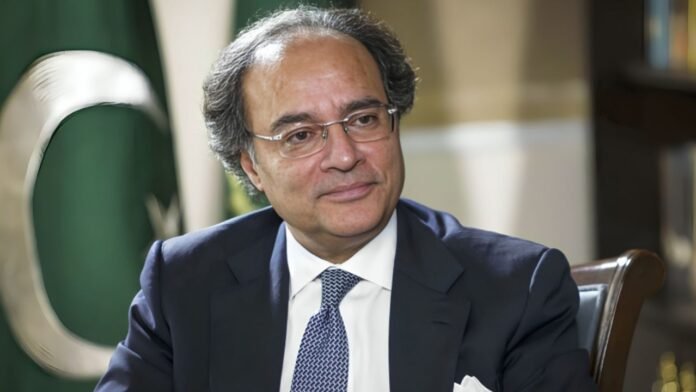Islamabad: Presenting the economic survey for the fiscal year 2023-24, Finance Minister Mohammad Aurangzeb stated that under the administration of Prime Minister Shehbaz Sharif, a standby agreement was made with the International Monetary Fund (IMF). He said, We had no Plan B, and we can present the budget for the next fiscal year due to this agreement. Countries run on taxes, not charity, there are no sacred cows, and everyone must contribute to the economy. Inflation will decrease more and interest rates will come down to single digits in the next few months and years. For the first time, tax collection has gone up by 30%. The survey showed that per capita income increased by $129, reaching $1,680 compared to $1,551 last fiscal year.
Addressing a joint press meeting with Minister of State Ali Pervaiz Malik and others, Finance Minister Aurangzeb said that at the end of the last fiscal year, the GDP growth rate was 0.2%, and the rupee had depreciated by 29%, with only two weeks of import cover left. Now, foreign reserves exceed $9 billion, sufficient for two months of imports. He noted that large-scale manufacturing faced challenges due to high interest rates and energy inequality. Still, the agricultural sector showed significant growth, with bumper crops and notable development in dairy and livestock. Agriculture remains a key focus for us.
The highest growth rate in 19 years was 6.25 percent in agriculture, contributing to overall economic expansion. The 30 percent increase in the FBR’s tax collection rate was unprecedented. Provinces also played a good role in the primary surplus, which deserves credit. Toward the start of the monetary year, the record shortage was assessed to be around $6 billion. By year-end, it is normal to be around $200 million, a critical achievement.
The current account was in a 3% surplus for a few months. Caretaker government measures have driven currency stabilization. Including curbing illegal money transfers and smuggling and reviewing Afghan transit trade. Inflation has also been gradually decreasing, from 38% at the end of last year to 11.8%. With a reduction in both core and food inflation rates. The policy rate has been lowered, and we expect this monetary easing to reduce inflation further and positively impact the economy, with policy rates expected to drop to single digits in the coming months and years.
Measures for economic stability have positively impacted the market, attracting foreign buyers to the stock market and indicating overall economic stabilization. Talks with the IMF have been productive, and Pakistan completed the 9-month standby agreement, benefiting from disciplined management. The government is serious about reforms, aiming to increase the tax-to-GDP ratio, reform the tax system, and improve energy and state-owned enterprises.
Public-private partnerships will manage strategic SOEs. Ongoing positive progress is expected with the IMF. Two key aspects of reforms and economic stability are:
- Policy implementation.
- Addressing leakages in the FBR.
- Enhancing the track and trace system.
- Digitizing the FBR.
Everyone must contribute to national matters; welfare organizations may run on charity, but countries do not—they run on taxes.
The annual theft estimate in the power sector is Rs 500 billion, and we are improving corporate governance and privatizing DISCOs. Agriculture will continue to be a major pillar of Pakistan’s economy. Agriculture and IT sectors, unaffected by the IMF, will drive growth, and we are working with the State Bank Governor to provide loans to these sectors. The government is taking measures to reduce the role of intermediaries in agriculture. The Punjab government has initiated actions and plans to collaborate with other provinces. They should reconsider the wheat support price, and they will reform PASCO’s infrastructure.
Minister of State for Economic Affairs Ali Pervaiz Malik highlighted that economic stability and confidence result from the measures taken by Prime Minister Shehbaz Sharif. The focus is on strengthening economic stability to prevent future downturns, and we will continue working with the IMF. Prime Minister Sharif has instructed that no burden be placed on economically weaker segments.
The government is documenting the economy, turning non-filers into filers, and all Pakistanis must contribute to national development. The government must correct structural fault lines. Despite having a significant electricity capacity, load shedding occurs to prevent the growth of circular debt due to energy losses. The provinces are discussing how to combat electricity theft and expect positive developments soon. Capacity payments significantly burden the system, preventing necessary relief in electricity prices and impacting exports and other areas. Reforms and growth will address this issue.
The financial survey projects the GDP increase rate for 2023-24 at 2.38%. The current account deficit is 0.2%, exports are 25.7%, imports are 43.4%, the trade deficit is 17.7%, foreign exchange is 23.8%, and foreign investment is 1.5%.


